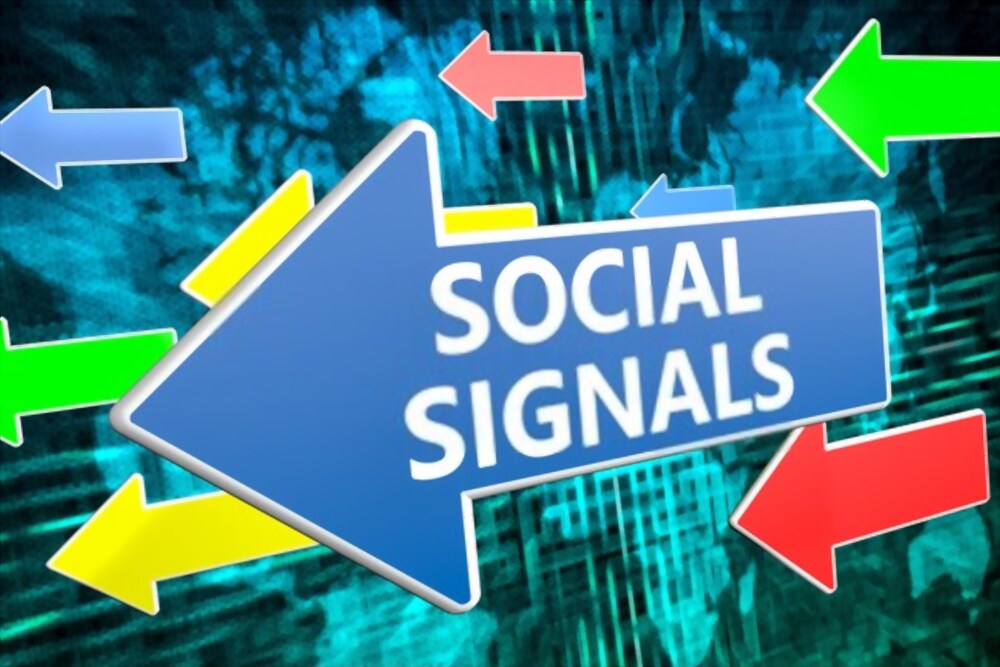It is well known that social media measures are essential for the distribution of good content and branding. But now the self-proclaimed social media guru wants to sell his service to you with regard to your own search engine optimization . A better placement on Google and thus a higher visibility for one’s own company is advertised. As is so often the case, however, Google is silent about the effects of social signals on ranking. As things stand today, the influence of social signals on the ranking is actually overestimated. Which doesn’t mean social marketing is a waste of money.
Table of Contents
So what are these social signal?

Anyone who enters the realm of social marketing or search engine optimization with their company will quickly notice that a different language is spoken here. SEM, SEO, SEA, Tweeds, Retweeds, Descritption and OG-Tags, just to name a few. The words could fill a book of their own and are essential in the online marketing jungle. Many understand the term social signals – as the mother of social media – Facebook. But social signals are so much more. Strictly speaking, social signals are user feedback. These are expressed differently in different social media. Facebook, for example, uses likes, shares and comments. If a user likes something, he can share, comment or like it.
Anyone who tweets and meets the benevolence of the followers gets “retweets”. This means that someone else’s post is redistributed to their followers. At the same time, the original tweed can be commented on.
Instagram, Tumblr or Pinterest work very similarly, but based on images. If the user likes what he sees, shares, comments or likes it.
Are signals really good for?

The assumption that the growing interest of users and companies for social media campaigns would also influence the Google ranking quickly became obvious. For a long time Google didn’t comment on it and later, as so often, more hieroglyphically. Some SEO agencies , however, set out to research the effects and also came to the conclusion that there was no clear result. Google spokesman Matt Cutts said the search engine could currentlydo not evaluate any social signals from Google and accordingly these are not relevant for the ranking. A murmur went through the SEO scene and a “but” remained. This but has recently been nourished by the cooperation between Google and Twitter. This means that in the future Google will be able to access user data at least from Twitter and thus evaluate social signals. Matt Cutts’ statement has thus been put into perspective in part.
Social signals still have potential – also for SEO ranking.

However, it is not that easy to dismiss social signals. This was also emphasized by Matt Cutts from Google. Because he said that social signals are not relevant for the ranking, but he also sees the importance of social signals. Because with the help of social media, content can be distributed quickly, well and easily. This generates traffic for your own site and helps to build the company branding. But there are a few points to consider.
The content counts: only those who create good content can hope for a positive reaction from the users. Unique and new content also promises that bloggers and authors will pick up on the content and thus ensure strong and topic-relevant backlinks. Those who generate backlinks in this way also increase the Google ranking.
Facebook example:
If you don’t just want to rely on Twitter, Facebook is a good choice. As one of the largest social media platforms, this is always worth a second look. In recent years, users have become more and more sensitive and good social signals are no longer given for free. It is increasingly about creating good content, tailored to the user, as well as being unique and informative. If the basis is correct, there are a few adjusting screws that need to be adjusted, but which ensure greater visibility.

- Interesting content: There are user groups that find it very easy to be liked, shared or commented on on social media. Other professions, however, have a really difficult time. Anyone who wants to promote a celebrity magazine on Facebook creates new articles about the most popular celebrities and watches them being shared. You hardly have to look for the headlines here. Only the preparation has to be right. But it is difficult for a printer. Admittedly, nobody is really interested in how such a pressure actually works. Likes us shares? Nothing! However, if the said print shop has a guide on how to find the best wedding photographer or writes it himself, many prospective bride and groom happily read and share it. Cute baby stories could also be an issue, provided
- Share options on one homepage are mandatory. This allows readers to share the content quickly and easily. The implementation of corresponding buttons on your own homepage is easy with the use of appropriate plug-ins. Only when the reader has it as easy as possible will the company receive the positive social signals it hoped for.
How to get more social signals.
- In order for the shared content on Facebook to look professional, special attention should be paid to the OG tags. The Open Graph tags need to be optimized and defined. Because the user decides within seconds whether the content is interesting and therefore worth reading. If the rich snippet fits, the content is read and – hopefully – shared.
- Last but not least, success has to be measured in order to get the right social signals. Which article was read and shared how often? What was well received by the user group, which content failed? Why didn’t the article go down well? Verifying this data is not very difficult today. With its insights, Facebook offers the possibility of monitoring and evaluates the data clearly and well. Also, Google Analytics is an opportunity to better get to know its users for your website. Twitter and Co. have similar offers for evaluating user data.
As things stand today, social signals are actually relevant to Google via the back door. If the content is right and thus generates both traffic and relevant backlinks, social signals become a turbo for Google ranking.

